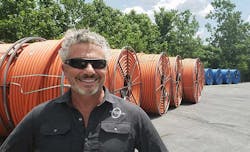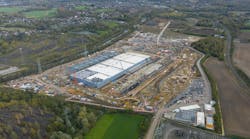Quantum Loophole Unveils Deals for 4 Customers, 240 Megawatts of Power
Data Center developer Quantum Loophole says it has lined up deals for a whopping 240 megawatts of capacity at its new hyperscale campus in Frederick County, Maryland. The company is building a 2,100-acre campus in Adamstown, Md. to provide cloud computing companies with huge sites that offer enough land and power for years of growth.
“As of today, we have signed contracts with four different entities representing more than 240MW of phase 1 power on our Frederick campus,” said Josh Snowhorn, Founder and CEO of Quantum Loophole.
Quantum Loophole is seeking to create a new geographic sub-market to support the massive cloud cluster in Northern Virginia, extending the market across the Potomac into Maryland. Adamstown is about 20 miles north of Ashburn, the key regional connectivity hub. Today’s announcement suggests that the company’s vision for master-planned “data center cities” is resonating with large customers.
The Adamstown project has also likely benefited from power constraints in Loudoun County that will limit new construction in the next several years as Dominion Energy expands its regional transmission capacity.
In May, Aligned Data Centers became the first publicly announced customer for Quantum Loophole, signing an agreement to acquire land, power, and water at the new campus.
First Fiber Tunnel Under Potomac Underway
The Frederick County campus won’t come online until early 2024, but is expected to arrive with 1,080 megawatts of power, and infrastructure to support energy strategies integrating natural gas, energy storage, and hydrogen. It will tap the massive power infrastructure of the former Alcoa Eastalco Works smelting plant, which offers a gigawatt of transmission power capacity.
In July, Quantum Loophole began construction on its QLoop network, a 40-mile fiber ring connecting the Adamstown campus and a data center cluster in Leesburg, which will tie into the data center districts in Ashburn and Manassas. In August, the first of two tunnel borings under the Potomac River was completed.
“This is a significant advancement as it is the first boring of the Potomac completed in many years and is positioned more than 90 feet under the bedrock of the river,” Quantum Loophole said in a press release. The approximately 3’500-foot-long boring begins with a 12-inch pilot hole that is now completed – the implementation of its 26-inch outer diameter sleeve will be installed after a back reaming process.”
Recent economic incentives have strengthened Maryland’s positioning as an option to host spillover demand from Northern Virginia. In 2020 Maryland enacted new tax breaks for the data center industry, including exemptions from state sales and use tax for investments of $5 million or more. Frederick County recently amended its zoning ordinances, explicitly designating data centers as a permitted use in areas zoned light industrial or general industrial.
Quantum Loophole’s approach is optimized for the largest players in hyperscale computing, who operate cloud campuses that concentrate massive amounts of computing power in multiple data center facilities. These data center hubs enable companies to rapidly add server capacity and electric power, creating economies of scale as more workloads migrate into these massive server farms.
That fits with trends in data center leasing in which hyperscale customers – a group led by Meta, Amazon Web Services, Microsoft and Google – are racing to reserve space to ensure they have room to keep growing for 2 to 5 years.
About the Author



